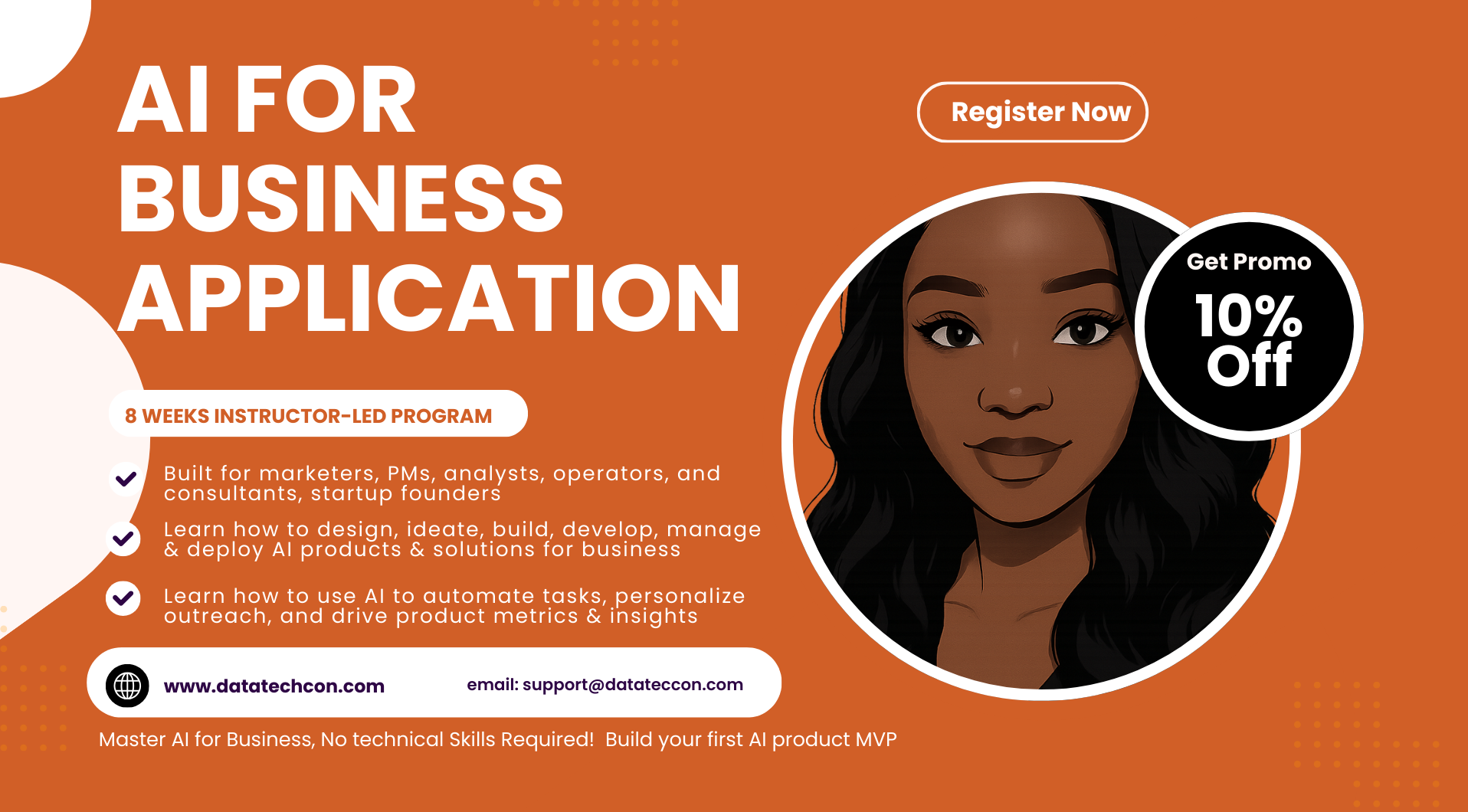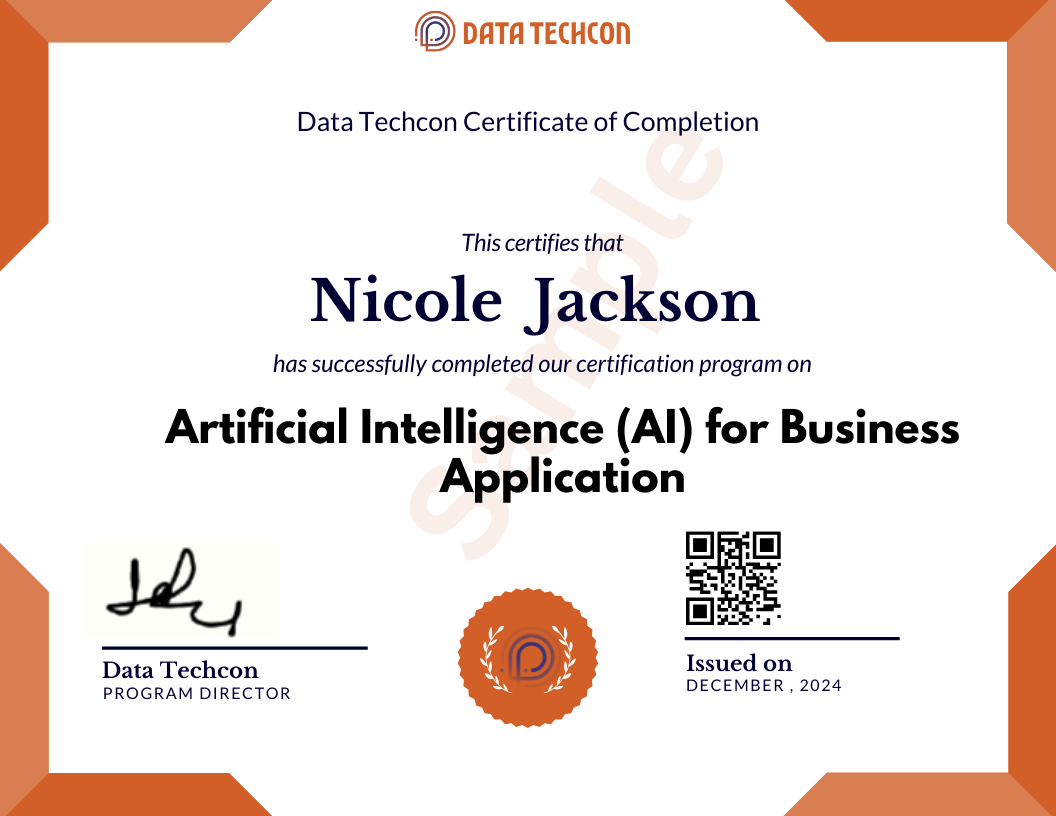AI for non-coders – AI for Business Application
04/01/2025 2025-09-16 16:13AI for non-coders – AI for Business Application

Artificial Intelligence for Business Application Program
Join our 8-week AI for Business Applications Program. Learn how to apply AI tools to real business problems—plus a beginner-friendly coding session in Week 5.
This program is designed for professionals who want to lead AI initiatives and transition into AI-focused business roles. You’ll learn how to identify real-world AI opportunities, validate ideas with data, design and manage AI products, and lead cross-functional teams through the full product lifecycle. The program covers AI fundamentals, product strategy, Agile project management, model integration, go-to-market planning, and responsible AI practices—equipping you with the practical skills to drive innovation and growth in any business setting.
This course is designed to help you lead AI initiatives and land AI-focused business roles—without needing a technical background. By the end of the program, you’ll be able to:
- Understand the AI ecosystem and identify business opportunities
- Design AI products and evaluate their feasibility using data
- Manage AI development using agile practices
- Build, launch, and scale AI-powered solutions
- Lead AI teams and confidently drive innovation in your organization
The program is packed with weekly hands-on projects, designed to help you apply what you learn immediately and build a strong portfolio.
Weekly sessions are held on Fridays at 4pm pst and runs for 2hours -2:30mins. Office hours are held twice a week for Q & A
What Makes This Different:
Built for marketers, PMs, analysts, operators, and consultants, startup founders
Week 5 covers AI tools & beginner coding (no experience needed)
Learn how to use AI to automate tasks, personalize outreach, and drive insights
Estimated Completion Time
2 Months
6 - 10hrs of study / week
Next cohort
Oct 24th, 2025
Limited spots available.
Training Cost
$1,800
Pay in full or 2 Installments of $900/month
AI Program Weekly Session Breakdown
WEEK 1 - Introduction to AI Ecosystem & Business Use Cases
Understanding AI Fundamentals, Concepts & Real-world Application
Build a strong foundation in AI by exploring essential concepts, technologies, and real-world use cases. This session sets the stage for understanding how AI fits into modern business and product strategies.
- Introduction to Artificial Intelligence: What it is and why it matters
- Overview of AI Technologies: Machine Learning, Deep Learning, and Generative AI
- Understanding Large Language Models (LLMs) – e.g., ChatGPT, Claude, Gemini
- Common AI Frameworks & Tools used in product development
- Key Concepts: Training data, models, inference, evaluation, bias
- Business-Driven AI Use Cases across industries
- What makes AI products different from traditional software
WEEK 2 - AI Product Sense & Product Development Lifecycle
Data-driven Feasibility Validation, Market Research & Competitors Analysis
- Understand how to evaluate AI product ideas using data
- Conduct feasibility assessments to determine if AI is the right solution
- Explore frameworks for validating product-market fit for AI products
- Learn techniques for conducting market research and analyzing competitors
- Identify risks, opportunities, and gaps in the AI product landscape
- How to identify Opportunity Sizing
Project: Choose an AI product idea and evaluate its potential through a structured, data-driven process. This project will guide you through key steps used by real product teams to validate feasibility, assess market fit, and analyze competition
WEEK 3 - AI Product Development Strategy
AI Tech Stack, Feature Design & Development Planning
- Develop a strategic roadmap for building AI-powered products
- Understand key components of the AI tech stack (data pipelines, models, APIs, etc.)
- Define core and differentiating features aligned with user needs
- Learn how to scope MVP features for AI solutions
- How to scope AI features that solve real problems
- How to create comprehensive product strategy & roadmap for AI product
- Feature Prioritization Frameworks & Mapping AI features to painpoints
- Explore collaboration between product, data, and engineering teams during development
Project: Create a Comprehensive Strategic Product Roadmap for Your AI Solution
WEEK 4 - Managing an AI Product Development Project
Agile Methodology, Epics, Sprints & Success Metrics
- Apply Agile principles to AI product development
- Learn how to create and manage epics, user stories, and acceptance criteria
- Define clear success metrics for AI features and iterations
- Plan and execute sprints effectively, tailored for AI workflows
- Navigate key Agile ceremonies: sprint planning, stand-ups, reviews, and retrospectives
- Understand how to adapt Agile to handle model experimentation, iteration, and deployment
Project: Design and manage a 1-month sprint roadmap (1 sprint per week) for your proposed AI product. Define an EPIC, Acceptance Criteria, Success metrics. Use a project management tool like Jira or Trello to organize your backlog.
WEEK 5 - Building Machine Learning & Fine-tuning Gen AI Models
How ML & Generative AI Power Chatbots and Automation
- Explore Large Language Models (LLMs) like ChatGPT, Claude, and Gemini
- Build AI product using ML & fine-tune Gen AI LLM
- Step-by-step demo on building and integrating ML models into products
- Learn how AI chatbots and virtual assistants are built and used
- Analyze real-world case studies (e.g., GPT, Spotify AI recommendations)
- Introduction to AutoML tools and their role in product innovation
Project: Build an AI Feature Using No-Code Machine Learning Tools
WEEK 6 - Building RAG & Agentic AI Products
From AI model to product – Bringing AI features to Life
- Building real AI products: Agentic AI to automate business processes
- Finetuning LLM using RAG & Prompt-based engineering
- Key decisions in integrating AI into apps, platforms, or workflows
- Understanding APIs, pipelines, and real-time inference
- Infrastructure considerations: cloud tools, data storage, and scaling
- Evaluating AI product performance
- Common pitfalls and how to avoid them in AI product builds
Project: Design and Prototype an Agentic or RAG AI System
WEEK 7 - AI Product Launch, GTM & Responsible AI
Go-to-Market Strategy, Growth Planning & Ethical AI Principles
- Building a Go-To-Market (GTM) plan for AI products
- Elements of a strong GTM strategy for AI products
- Positioning and messaging for AI-powered solutions
- Planning for user onboarding, activation, and engagement
- Elements of a strong GTM strategy for AI products
- Crafting messaging that communicates AI value clearly
- Pricing models and monetization strategies
- Launch planning: internal alignment, user readiness, feedback loops
- Scaling strategies: partnerships, channels, retention, and iteration
- Metrics that matter post-launch
- Measuring product performance and user feedback loops
- Understanding AI risks: bias, fairness, and explainability
- Principles of Responsible AI: transparency, accountability, and safety
Project: Create a clear go-to-market strategy for your AI product and evaluate it through the lens of ethical and responsible AI. You’ll define how to launch, promote, and measure success—while identifying risks related to fairness, bias, and transparency.
WEEK 8 - Wrapping thing up
Presentation & QA
- Final capstone presentations
- Peer and instructor feedback
- Group reflection on learnings and key takeaways
- Final Q&A: clarify concepts, tools, and next steps
- Guidance on career paths and applying your new skills
Final Capstone
- Present your AI product idea
- Walk through the problem, AI solution, GTM plan, and ethical considerations
- Showcase how you’d lead the product’s development and launch
Flexible Payment Options
Ready to Enroll? Take advantage of our payment options or pay in full
Understand how to apply AI to solve real-world business problems
Identify opportunities for AI across business functions and workflows
Design and manage AI product features aligned with business goals
Use data to validate product ideas and guide decision-making
Build and integrate no-code AI and ML models into products
Define success metrics and create outcome-driven reports
Communicate AI solutions clearly to cross-functional stakeholders
Apply ethical and responsible AI practices in real-world scenarios
Leave job-ready to lead or support AI initiatives in business roles
Curated by a FAANG expert with real-world experience leading AI product development
Learn directly from top Fortune 500 professionals and AI industry leaders
Hands-on exercises and real-world assignments for practical learning
Weekly office hours to guide your progress
1 year access to all session recordings and AI templates
24/7 learning support to keep you on track
Resume building support and mock interview prep tailored to AI roles
Exclusive access to job portal and career resources
Affordable pricing with flexible payment options
Personalized portfolio support to showcase your AI skills
Business professionals looking to pivot into AI roles without coding
Product managers who want to lead AI-powered solutions
Analysts and data scientist ready to up skill into AI roles or drive AI product initiatives.
Startup founders building AI-driven products
Consultants and strategists advising on AI adoption
Team leads and managers overseeing AI initiatives
Anyone looking to bridge the gap between business and AI
Project Managers, Program Managers, and Scrum Masters looking to understand technical terms and the design/development of AI products for the projects they manage
Program Completion
Upon Completion of this course, you will:
- Receive a Certificate of Completion.
- Receive free prompts & Templates
- Receive free mock interview prep.

Certificate of Completion
Succeed with Data Techcon Courses
Frequently asked questions
How to register online?
Enrolling for any Data Techcon class is easy. Select the program you would like to enroll for and select enroll now to get started.
What payment methods do you accept?
We accept payment via paypal account, debit card or credit card. If you are considering order payment methods, kindly send us an email.
How do you process my information?
Your data will be kept private and secure on our database. No illegal use without prior notice.
How long do I have access to the training videos?
All students will have one year access to all training course materials; videos, documents and slide decks. Certificate-holders will be invited to join a private LinkedIn group of all past Data Techcon alumni’s .
Do I need to have tech background to enroll?
You do not need to have tech background, degree or experience to enroll. Our program are curated to help everyone hone in demand skills in data science and analytics.
Will I receive certificate of completion?
Yes, a certificate of completion will be issued to all students that successfully complete the program and turn in their final capstone projects.
Who teaches the course?
The course is led by an experienced AI product leader from a FAANG company, with a proven track record of building and launching AI-powered solutions from ideation to deployment. You’ll also learn from guest instructors and mentors from top Fortune 500 companies, bringing real-world insights from the frontlines of AI, product, and data.
Why is AI relevant today?
AI is transforming how businesses operate, make decisions, and deliver value. With the explosion of data, companies need professionals who can lead AI-driven solutions—not just build them.
Over 90% of the world’s data was generated in just the last two years, and industries across healthcare, finance, retail, and tech are turning to AI to unlock insights, automate tasks, and personalize experiences.
The U.S. Bureau of Labor Statistics projects 11.5 million new jobs in data and AI-related fields by 2026.
According to Forbes, preparing for the future of work means learning how to use and apply data generated by AI.
This course gives you the skills to lead that change—whether you’re staying in your current role or transitioning into a new one.
What roles can I apply for after the program
Explore AI Roles for non-coders
1. Customer Engineer AI/ML
2. AI Product Manager
3. AI strategist
4. Data & AI
5. AI Project Manager
6. AI Innovation Project Manager
7. AI Product Engineer
8. AI Solutions Engineer
9. AI Specialist
10. AI Consultant
How do I contact support?
You can contact our help center or any contact method (phone call or email: info@datatechcon.com to get help.
What happens at the end of the program
Once a program has finished, you will be invited to provide receive detailed email from our support team on resume revamping, interview prepping guide and job search support. Also, you will be invited to provide feedback on your course experience.
How can I get a discount?
Discounts Available
Referred by someone? Mention it before enrolling to qualify for a referral discount.
Alumni receive an automatic 10% discount on their next course.
How many cohort do you offer annually?
We offer four cohorts annually. Our cohorts are run on a quarterly basis and enrollments for each cohort start a month prior to the cohort start date.
What type of support is provided during the program
During the program, all students receive continuous weekly 1-on-1 mentorship support and guidance from lead instructors to help make sure students are getting the best out of their educational investments
Steps to Success
Roadmap to a Successful Data Science & Analytics Career
Hone New Skills

#1 Accelerate your skills
Learning new skills gives you more opportunity to stay competitive in the job market. With new skills, you can confidently apply for any data analytics role. However, goal setting is a crucial step in learning new skills. After enrolling for the program, you should set your career transition goal to help track your progress. Then, you can collaborate and interact with your instructor and fellow classmates.
Milestones Creation

#2 Create weekly milestones
The roadmap to achieving any goal starts with breaking the goal into milestones. After creating your weekly tasks, you need to dedicate time and effort to achieve your goal.
Self-discipline

#3 Self-discipline & responsibility
Who says that having to be more self-disciplined is a disadvantage? It is true that studying requires more time-management skills, because you will spend a lot of time on your own without someone physically close to keep you focused on daily practice.
Start Learning

#Fortune 500 Industry Instructors
It’s time to put your plans into action by choosing from our instructor-led training programs or self-paced online courses. Our courses are curated by analytics professionals who work in fortune 500 companies and have both technical skills and business acumen that help businesses drive growth. Ready to start learning? Click on any of the buttons below to enroll.

